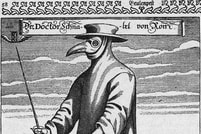For those not into 17th century English poets, this final line from John Milton’s,
On His Blindness, had particular significance in 1665 at a time when denominations of the Christian world were debating whether we sinners were saved by faith alone or by a combination of faith and good works. This question was the cause of the Reformation, the split between the Protestant churches and Catholic Church. Milton was siding with those who felt that faith alone was the way to salvation. Being a good person was
nice but not necessary in the eyes of God. John Wesley, founder of Methodism, was among those who disagreed, however. Faith alone was not enough. Good works, things like charity and kindness, were equally parts of the road to salvation. It was simply not enough to “only stand and wait” as John Milton suggested.
In the summer of 1665, debates over the path to salvation would have been in context of the deadly epidemic,
Black Death. This wave of the bubonic plague started slowly in a London neighborhood, but by May of 1665, 43 had died. In June 6137 succumbed and then in July, 17036. Finally, at its peak in August, 31159 people perished. In all, 15% of the London population perished during that terrible summer. There was little recourse beyond prayer and primitive forms of protection like the avian-like “gas mask” worn by physicians to damp foul smells. Filled with lavender and camphor to ward off the invisible pestilence, this protective gear was 17th century state of the art – the best that science and medicine had to offer.
We can all take heart that science has advanced remarkably since Milton. While we justifiably worry about the elapsed
weeks of time needed to properly garb our pandemic frontlines and
months of time to a vaccine or other therapies, we should consider, as a frame of reference, that the Black Plague lasted more than three centuries in Asia and Europe without remedy. As an optimist by nature, I still find myself fighting off angry thoughts and wondering how we ever got into this mess. Better to focus on the moment. Seize the day. What can we do to help the frontlines? Where is our salvation?
Perhaps, as in the 17th century, there is power in faith. I would not disparage it. As an aphorism from the Second World War maintains, “There are no atheists in a foxhole.” Beyond this, however, what about “good works”? With regard to our current dilemma, it seems for most us who are
not on the front line – not clinicians, not public servants, not essential service workers – there are just two things we can do:
- Support the front lines. Give them everything they need immediately and let them feel our gratitude.
- For the rest of us, oddly, doing nothing is our good work. As Milton said “They also serve who only stand and wait.” We need to stay at home for now to protect each other AND the front line. Give them the gift of time to heal the sick and find ways to remediate this scourge.
Stay well everyone.
O.L.D.
P.S. Well, perhaps not
nothing. My organization,
GBMP, is assisting companies who wish to turn downtime into learning and improvement time through virtual Lean, Six Sigma and Shingo Model workshops, training, coaching and project assistance. The remote platforms are robust and interactive learning and sharing are possible whether your workforce is presently at home or in the workplace, local or dispersed, in one state, multiple states or spread across countries.
Contact us to learn how we can assist your team or
peruse some of our scheduled Lean learning opportunities.
